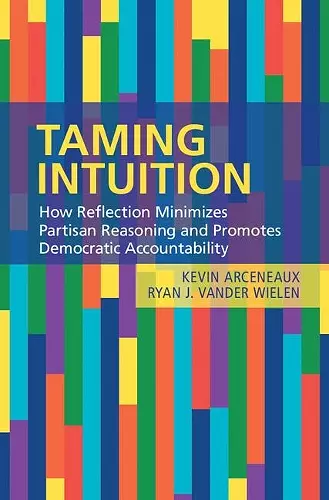Taming Intuition
How Reflection Minimizes Partisan Reasoning and Promotes Democratic Accountability
Ryan J Vander Wielen author Kevin Arceneaux author
Format:Hardback
Publisher:Cambridge University Press
Published:11th Aug '17
Currently unavailable, and unfortunately no date known when it will be back
This hardback is available in another edition too:
- Paperback£30.99(9781108400312)

Individuals vary in their ability to reflect on and override partisan impulses, affecting their ability to rationally evaluate politicians.
This book will appeal to readers interested in understanding why some voters are able to objectively update their assessments of political parties and politicians in light of credible information, while others are less capable of doing so. The arguments and evidence presented are accessible to a broad readership.The success of democratic governance hinges on an electorate's ability to reward elected officials who act faithfully and punish those who do not. Yet there is considerable variation among voters in their ability to objectively evaluate representatives' performance. In this book the authors develop a theoretical model, the Intuitionist Model of Political Reasoning, which posits that this variation across voters is the result of individual differences in the predisposition to reflect on and to override partisan impulses. Individuals differ in partisan intuitions resulting from the strength of their attachments to parties, as well as the degree to which they are willing to engage in the cognitively taxing process of evaluating those intuitions. The balance of these forces - the strength of intuitions and the willingness to second guess one's self - determines the extent to which individuals update their assessments of political parties and elected officials in a rational manner.
'Arceneaux and Vander Wielen's book is transformative as it explores a question that has been ignored when it comes to democratic citizenship: what happens when citizens reflect? They develop an impressive theory and use state-of-the-art methods to show that reflection fundamentally alters how citizens reason and make decisions. The book not only alters common understandings of citizens' behaviors, but also sets an agenda for the future of all research on democratic citizenship.' James N. Druckman, Payson S. Wild Professor of Political Science, Northwestern University
'In this remarkable book, Arceneaux and Vander Wielen apply dual-process models of how people think to questions of how they reason about politics. They develop and refine a powerful conceptual model and then provide insightful, innovative empirical tests. I have long been looking for a book like this one that integrates recent insights about human cognition with long-standing questions about how voters think. This ambitious, thought-provoking research should be read by anyone who wants to understand the role of intuition and reflection in voter decision-making.' Daniel Hopkins, University of Pennsylvania
'This book takes on one of the most important political questions of our time. Its central argument, and the evidence presented in support of it, is exciting and provocative. To date, no one has figured out how to reduce the myriad information-processing biases identified by Motivated Reasoning Theory that produce the polarization and lack of compromise plaguing our current politics. Unfortunately, giving people new and credible information in particular, and even education in general, often exacerbates these biases. The more subtle answer offered by Arceneaux and Vander Wielen is that those with the ability to coolly reflect on controversial topics can avoid making these common mistakes. Now if we can only figure out how to train people to hold such a rare combination of curiosity and cool-headedness! Taming Intuition will, at the very least, be an important voice in an important debate.' Nicholas Valentino, University of Michigan
ISBN: 9781108415101
Dimensions: 235mm x 158mm x 20mm
Weight: 500g
260 pages